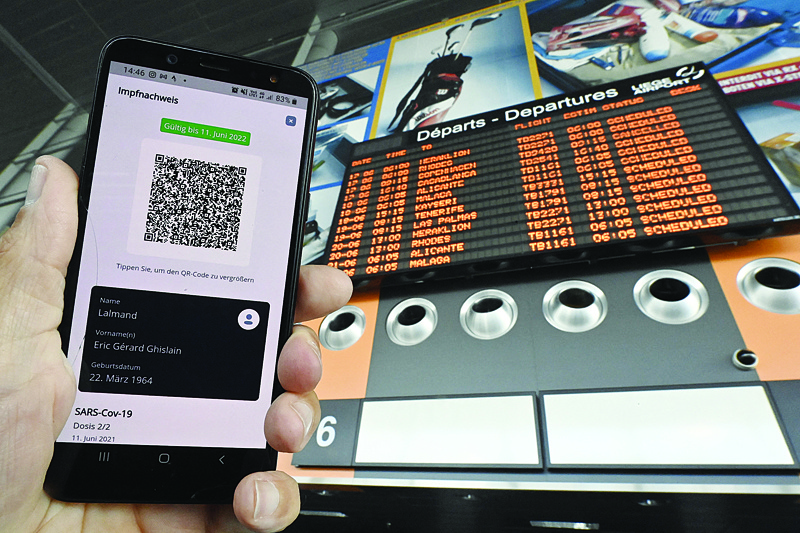BRUSSELS: The EU yesterday agreed to lift coronavirus restrictions for US travellers as Western countries moved toward a return to pre-COVID life, but in a stark reminder that the global pandemic was far from over, Moscow ordered mandatory jabs over a "dramatic" rise in infections.
The United States was among eight countries and territories added to a European Union white list, exempting them from the COVID-19 travel ban ahead of the busy summer holiday season critical to the economies of many member nations. EU states can still choose to require travellers from these areas to undergo Covid-19 testing or to observe periods in quarantine, but once the new list is approved the recommendation is that they should be exempted from a blanket travel ban that the bloc imposed in March 2020.
The other countries and regions added to the white list yesterday were Albania, North Macedonia, Serbia, Lebanon, Taiwan, Macau and Hong Kong, officials and diplomats said. France meanwhile said that masks would no longer be required outdoors from today and that an unpopular COVID curfew would be scrapped on June 20, 10 days earlier than initially planned, thanks to falling infections. "The health situation of our country is improving faster than we expected," said Prime Minister Jean Castex.
Curbs fall coast to coast
Europe's move came a day after COVID restrictions were dropped from sea to sea in the US, with New York City and the state of California lifting nearly all curbs. The lifts came as the national Covid-19 death toll in the US topped 600,000 -- the largest in the world by far, ahead of hard-hit Brazil and India.
After a much-criticized early response to the pandemic, the US has since organized one of the world's most effective immunization drives. "We have hit 70 percent vaccination," New York Governor Andrew Cuomo said on Tuesday as he announced the lifting of curbs. "It means that we can now return to life as we know it." Across the country, Governor Gavin Newsom told Californians that they could ditch their masks nearly everywhere, except for schools, hospitals and public transport.
"Finally we are here, to turn the page... to move beyond social distancing and physical distancing." US progress against COVID was echoed in Asia where India, which saw overwhelmed health services and record infections and deaths in April and May, reopened its famed Taj Mahal monument yesterday. Cases have declined in recent weeks, with several major cities including New Delhi and Mumbai easing many restrictions. Thailand meanwhile said it planned to fully reopen to foreign visitors in four months.
'Dramatic' rise in Moscow
But in a stark reminder that the global pandemic that has killed more than 3.8 million people worldwide was far from over, Moscow Mayor Sergei Sobyanin warned "the coronavirus situation continues to unfold dramatically." "We simply must do everything to carry out mass vaccinations in the shortest possible time and stop this terrible disease, stop the deaths of thousands of people," Sobyanin wrote in a blog post as he ordered compulsory jabs for Muscovites working in the service industry.
The announcement came as Russia's second city of Saint Petersburg hosts matches in the Euro 2020 football tournament, with thousands of foreign visitors expected to fly in for the sporting extravaganza. Russia has the sixth-highest caseload in the world, but President Vladimir Putin -- who was holding a summit with US President Joe Biden in Geneva yesterday -- has repeatedly claimed the country has handled the pandemic better than most other nations.
The increase in cases comes as authorities struggle to encourage Russians to get vaccinated, even though the country launched a mass campaign of free jabs in December and has developed and approved four vaccines - Sputnik V, EpiVacCorona, CoviVac and the one-dose Sputnik Light. Sobyanin, whose city of some 12 million is the epicenter of the coronavirus outbreak in Russia, said just 1.8 million residents had been inoculated.
Cap for Olympic fans
Japan, which next week hosts the 2020 Olympics delayed a year by the pandemic, said yesterday that it planned to set a cap of 10,000 fans at sports events ahead of the games. The proposed measure would come into force after a COVID-19 state of emergency in Tokyo and other parts of the country ends on June 20, and would last until the end of August, said Yasutoshi Nishimura, the minister in charge of virus measures.
The plan, expected to become official later this week, would limit spectators to 50 percent of a venue's capacity or 10,000 people, whichever is smaller, he said. Worldwide, the novel coronavirus, which emerged in China in late 2019, has killed at least 3,824,885 people, according to a tally from official sources compiled by AFP. The World Health Organization estimates that the pandemic's overall toll could be two to three times higher than official figures, due to the excess mortality that is directly and indirectly linked to COVID-19. - AFP



